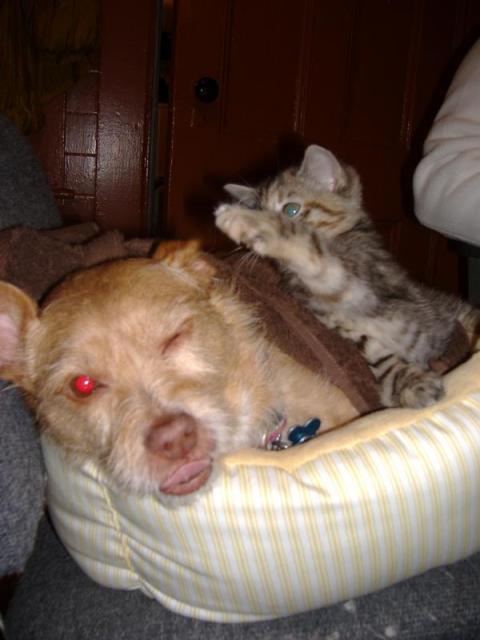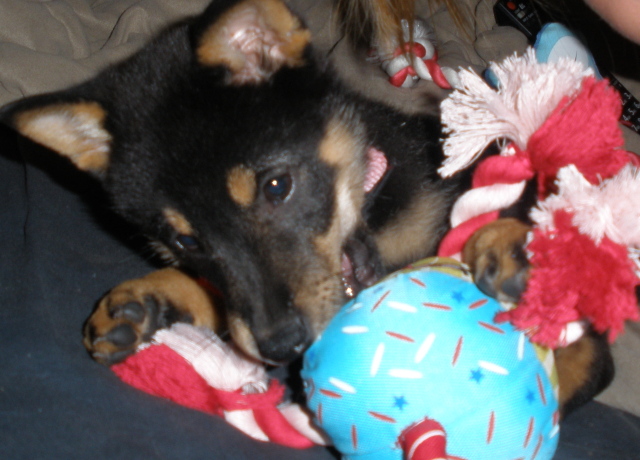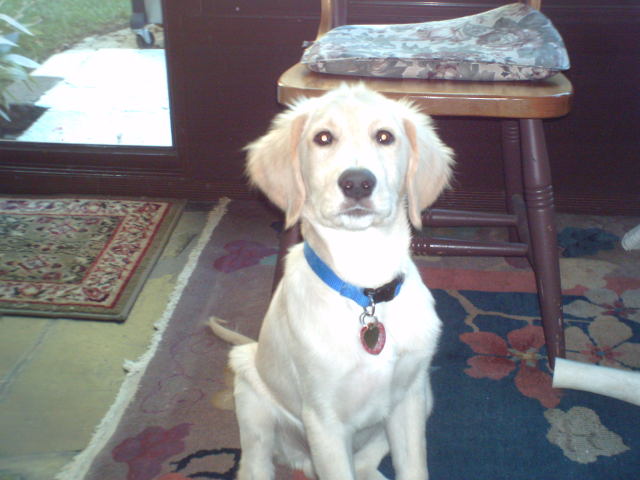QuestionI have an 8 month old staffy bitch (desexed) and my girlfriend has a 10 year old whippet bitch (desexed) we also have 2 adult cats and 1 12 week old kitten. I have a 14 year old son.
One month ago I took on an 8 month old bullmastiff x great dane male who needed to be rehomed as he did not like being left by himself, would whine and bark and the previous owner had been getting complaints from the neighbours etc, she had a 6 month old baby and an 8 year old son, absolutely NO history of aggression from this dog towards people, or other dogs, not while he was eating, never.
The dog (zeus) was entire when I got him, but I had him desexed after 1 week (I am a vet nurse so took him into the clinic for 4 days to get him used to the place and the people and have positive experiences etc)
Zeus was fantastic initially, no dramas with the dogs or the cats, not interested in chasing them, even snuggled up with the kitten and snoozed on more than 1 occassion.
My dogs are walked for at least 30 mins everyday unless it is REALLY bad weather, I have a basic understanding of dog behaviour, the dogs sit and wait until I give a release command(o.k) to eat, they must sit before they come in or out the door and the humans go first, the dogs all have their own beds and sleep inside of a night but spend most of their time (the 2 young dogs) outside during the day (the old girl spends most of her time inside sleeping)
On monday I gave the dogs a bone each outside, they were all tied up in different areas of the large back yard to avoid fights. I went up after 20 mins and patted zeus and talked to him and touched his bone etc all with no dramas.
2 nights later it was POURING here so I bought them all in on their own beds in different areas of the loungeroom (it is a big room) tied them up and gave them all a bone. I went up to zeus after 10 mins and he growled at me... I had only patted him on the back and I approached from the front. I immediately loudly in a very deep voice said NO and eyeballed him, he eyeballed back but i kept eyecontact until he broke it and loooked and moved away and then I left him. 10 mins later I went up to pat him again and he growled again so again I said no but this time i took the bone off him and oput him outside.
He was there for 30 mins, I cleared up the other dogs bones etc let them all out to the loo and broughthtem back in onto their beds and 30 mins later when he was calm and laying down i went and lay on his bed with him and cuddled him etc, he was lying on his side, our kitten came towards him and was looking like she was going to hop up onto his bed and he just went her suddenly, lunged at her growling.
I pulled him back by his collar, yelled no and then left him. Later after he had been out to the toilet i bought him back in on lead, the kitten was laying down and i sat in a chair near her so he had to be close to her but wasn't on his bed, he sniffed her gave her a lick or 2 on the head then snuggled up with her.
Needless to say these incidences have shaken me up a bit (he is a big boy and is going to get a lot bigger)
So i decided just to leave bones out of the equation for a while, then last night i was laying on his bed with him, he was laying down but not on his side, the kitten walked past and the same thing happened? 10 mins later my son went to lay down with him (which he has done since we bought zeus home) and he growled and went at him.
I don't understand what is happening here and ahve no idea what the best way to deal with it is. I have a dog behaviouralist coming out next week but I am really keen to get your opinion ( i understand it is only an opinion without actually seing the situation) I am also in 2 minds about whether to keep this dog, if this is a fairly simple discipline problem, that can be rectified with training, that is one thing, but if this is his developing character, that is something else. The only thing that is the same is that every incident has happened while he was on his bed in the loungeroom, the only reason the kitten has been growled at is because she is the onl animal that has walked past his bed, I don't think it is about her per say, is this just a "I have settled in now and I think I might be the boss? " adolescent stuff? have you come across a similar situation? what would you reccomend I do?
Thanks in advance, sorry it is so long I just wanted to give as full a picture as possible
Jodie
AnswerThis dog is far too young to be demonstrating true dominance; you may have inadvertently created this problem or you may be seeing the real reason those people got rid of this dog. By way of creation: a dog's cultural approach to objects, even food, is: "if you give it to me, it's mine"; in other words, the "leader" will allow a lower "ranking" member to obtain an article (whether food or in the case of domestic dogs toys, bones, etc.); once relinquished, this article is the sole possession of the receiver unless and until the receiver voluntarily relinquishes it. When you, who are making an effort to maintain psychological rank to some extent, give the article to the dog, and then you return and casually handle the article (especially while standing over the dog and while the dog is tied), you are giving very mixed signals. Some dogs will move away from the article and avoid it for a few seconds; some will interact with you AND the article in a playful manner; some will offer a few seconds of interaction and then ignore the article or leave it; some dogs (breed and temperament dependent) will, during the first incident, acquire a reaction to this very strong mixed signal that will result, during the next incident, in aggression (usually growling). This sort of trophying behavior CAN result, over time, in obtaining dominance (in the dog's mind); behavior can influence rank in REVERSE (forcible psychological demotion using behavior modification methods can reduce rank, the dog's own overt behavior such as protecting objects can, over time, influence overall psychological response to enhance rank.) You then repeated this by tying the dog INDOORS with the same trophy object (restraint of this type can provoke aggression, usually over time but it occurs instantly in some cases)! This was a clear setup for a defensive reaction.
Additionally, when a dog is on "his" bed and you, the supposed "leader" sit in the bed WITH HIM, you are making a very large statement of rank; many dogs will get up and LEAVE when you even approach the bed with direct eye contact (this is the normal canine reaction to a higher ranking member approaching); some will put ears back and roll over if you sit next to them; some will turn their head (a calming signal indicating non threat) with ears back and then get up and leave; some will happily jump all over you, perhaps nipping playfully (a juvenile response intended to test rank), some will climb into your lap! This, again, is breed and temperament dependent. YOUR DOG perceived this odd behavior of yours (lolling in his bed, giving him lots of free attention -- petting -- when you had NO idea what he was thinking or reacting to: "why is s/he in my space, should I be worried, is this a threat" and you are rewarding it). There is no reason to sit in Zeus' bed with him and give him tons of free attention: I know you're giving love and comfort, he is interpreting this behavior from a dog's point of view, and he's brand new in your home, trying to make sense of it all. It's possible the kitten passing by concerned him because perhaps THE KITTEN would be displacing him, as well. This may be a simple reaction to anxiety and mixed signals in a breed mix with a strong predilection for dominance behavior.
For now: stay out of that dog's bed; do not handle his food or toys; your son repeated a behavior you had initiated in close proximity to your own. Dogs are more likely to "discipline" children with a growl or snap (click of tooth) than an adult who is clearly, to the dog, in charge.
You need to learn more about dog behavior; while you ARE knowledgeable, you don't have the full picture (and that's perfectly reasonable since it isn't your line of work!) This is fine if you have a Whippet, even with a well bred and carefully trained Pit mix (although it's a stretch), but with a Bull Mastiff mix it's not fine; this is a breed that really needs a very experienced owner. Here are some books you might be interested in reading (over time) that will flesh out your foundation of knowledge:
"How Dogs Learn", Mary Burch and Jon Bailey Ph.D.
"Genetics and The Social Behavior of The Dog", John Paul Scott and John L. Fuller
"If Your Dog Could Talk", Bruce Fogel, DVM
and if you really want to get into the academic aspect, volume three (protocols) of: "Handbook of Applied Dog Behavior and Training", Steven R. Lindsay (this is a text book.)
Call me cynical (making a living in a profession with animals has a tendency to create distrust in humans lol), but I don't believe for one minute that this dog never showed aggression in his former home: I do NOT believe it (and I don't care what they say: people LIE to get rid of a dog they don't want. I've seen it a hundred times, at least.) Until you see this behaviorist (and I hope you got veterinary reference and three client references and this person is extremely knowledgeable in treating aggression) make this dog work for everything: make him "sit" for all meals, going in/out, being petted, NO free attention (this is the Nothing In Life Is Free regimen). To assuage any anxiety Zeus may have acquired (NOT your fault!) instruct your son not to approach him in a direct line making eye contact and do this yourself. Approaching a dog head on with direct eye contact is dominant: this dog may be confused and he's certainly acquiring some sort of aggressive response, so maintain a low key profile. Stay away from his bed (don't climb in there with him) and do not waken him from sleep (to avoid startle response). The protocol to extinguish sudden aggression in any dog requires certain steps be taken, slowly over a week or two, to actively psychologically demote the dog, making him aware that he is not high ranking in this environment. You have two other dogs in this household which complicates matters. Luckily, they are both females (spayed or not, doesn't matter, dogs perceive sex); it's very likely Zeus would have fallen behind them in rank anyway.
I can't tell you if this dog's basic temperament is flawed; he's confused (by the change of household), anxious (because of mixed signals) and pretty much behaving like a Bull Mastiff in a tough situation. Be absolutely certain this professional you have hired does not attempt to provoke an aggressive response in order to diagnose the problem; not only is that amateurish, but it's dangerous. Every time this dog demonstrates aggression, he learns more about it. His basic temperament needs to be evaluated through interaction, a temperament test, training interaction, observation of the dog in his environment and with the other animals and people, etc. Initial consultations require at least two hours and should involve extensive hands on the dog (in this case, anyway) and interviews with everyone in the household, including a one to one interview with your son WITHOUT YOU being present (because kids share feelings at that time they might not with parents present: your son may be afraid of the dog now and doesn't want to tell you).
Zeus has been in your home a short time; he obviously arrived with baggage (unknown to you.) He's a juvenile, apparently not habituated to normal household living; his lack of socialization could result in aggression and this is an inherited trait in some Bull Mastiff AND Great Dane lines; BOTH these breeds can demonstrate aggression toward other animals (first generation mix pretty much carries the same predilections as purebred.) BOTH require a very strong, confident owner, heavy socialization (too late now, it's remediation only at this point), and training (no coercion). Both should be basically mild mannered, perhaps aloof to strangers but tolerant of them. BOTH these breeds can suffer from huge separation anxiety issues. If the dog's temperament is evaluated as unsound, you cannot keep this dog, not with teenage kids coming and going in your household; such a dog would require extensive, ongoing behavior modification and very few people are equipped to do this. My hope is that this is a stress reaction from a very young dog that doesn't know which end is up right now. PLEASE repost, using this same question (to remind me) with any other observations and ALSO with results from the appointment with your behaviorist.

 Post bladder surgery potty training for INDOORS!
QuestionTiki
QUESTION: Dear Dr. Connor,
My 10 ye
Post bladder surgery potty training for INDOORS!
QuestionTiki
QUESTION: Dear Dr. Connor,
My 10 ye
 Black lab - 1 yr
QuestionSheba
QUESTION: My lab loves to bite her
Black lab - 1 yr
QuestionSheba
QUESTION: My lab loves to bite her
 My dog is shaking and hiding under my bed recently
QuestionRorrie and Pencil
QUESTION: My dog, Rorr
My dog is shaking and hiding under my bed recently
QuestionRorrie and Pencil
QUESTION: My dog, Rorr
 My Shiba Inu
Question
Lola
I bought a registered Shiba Inu puppy fro
My Shiba Inu
Question
Lola
I bought a registered Shiba Inu puppy fro
 my 7 month old golden changed for the worse
QuestionRiley at 6 months
QUESTION: I got a gold
my 7 month old golden changed for the worse
QuestionRiley at 6 months
QUESTION: I got a gold